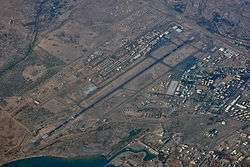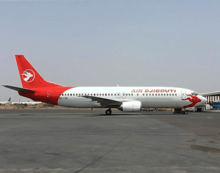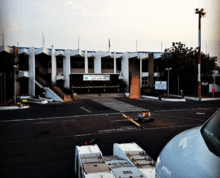Djibouti–Ambouli International Airport
Djibouti–Ambouli International Airport (Arabic: مطار جيبوتي الدولي, French: Aéroport international Ambouli) (IATA: JIB, ICAO: HDAM) is a joint civilian/military-use airport situated in the town of Ambouli, Djibouti. It serves the national capital, Djibouti City. The airport is located approximately 6 kilometres (4 miles) from the city centre. It occupies an area of 10 square kilometers.
Djibouti–Ambouli International Airport | |||||||||||
|---|---|---|---|---|---|---|---|---|---|---|---|
 | |||||||||||
| Summary | |||||||||||
| Airport type | Joint (civilian and military) | ||||||||||
| Serves | Djibouti City | ||||||||||
| Location | Ambouli, Djibouti | ||||||||||
| Hub for | Air Djibouti | ||||||||||
| Elevation AMSL | 49 ft / 15 m | ||||||||||
| Coordinates | 11°32′46.53″N 43°09′33.14″E | ||||||||||
| Website | aeroport-jib.com | ||||||||||
| Map | |||||||||||
 JIB Location of airport in Djibouti | |||||||||||
| Runways | |||||||||||
| |||||||||||
| Statistics (2009) | |||||||||||
| |||||||||||
Source: | |||||||||||
History


The airport was opened in 1948. Originally modest-sized, the facility grew in the post-independence period after a series of renovation projects.[1]
In the mid-1970s, the airport was enlarged to accommodate more international carriers, with the state-owned Air Djibouti providing regular trips to Air Djibouti's various destinations.[1]
Civilian use
Djibouti–Ambouli International Airport has a single terminal building, with one departure gate and one baggage carousel.
As the airport is located south of Djibouti City and its runways run east–west, an airliner's landing approach is usually directly over the conurbation of the capital, when the wind is from the west.[2]
In 2010, the airport served 176,861 passengers.[3]
Military use
In addition to its use as a civilian airport, the airport hosts a military presence from a number of countries. Military traffic makes up approximately 75% of the airport's total traffic volume.[4][3]
- Military of France[5]
- French Army 5th Overseas Interarms Regiment
- French Army Light Aviation, 2 Puma and 1 Gazelle helicopter
- French Air Force Base 188, 4 Mirage 2000-5, 1 C160, 2 Puma helicopters
- United States Armed Forces (Combined Joint Task Force-Horn of Africa)
- Camp Lemonnier – formerly a base of the French Foreign Legion, the camp is located on the southern side of the airfield
- Djibouti Air Force – located on the southwest side of the airfield.
- Japan Self-Defense Forces
- Japan Self-Defense Force Base Djibouti was established in 2009 on a 12 ha site adjacent to the airport; two P-3C aircraft and 180 personnel are stationed here. This is the only JSDF base located outside Japan, and is intended to protect Japanese nationals and ships in the region from terrorism and piracy.[6]
- Italian Air Force
- Supporting the European Union Naval Force – operating the General Atomics MQ-1 Predator.[7]
Air-traffic controllers controversy

According to military officials, US military flights comprised over 50 per cent of the 30,000 departures and arrivals in 2014. Civilian air-traffic controllers hired by the Djiboutian government monitor the airspace over Camp Lemonnier's runways, unlike other major US military bases. US federal aviation experts suggested that an unprofessional attitude on the part of the controllers potentially imperiled American military and civilian flights to and from the airport. US consultants stationed at the base reported that over a three-month period, the controllers made an average of 2,378 errors per 100,000 aircraft operations, an error rate reportedly 1,700 times greater than the US standard. FAA officials asserted that the controllers' lax attitude, which allegedly included barring drones from taking off or landing, stemmed from a belief on their part that the US drones were unreliable aircraft and dangerous weapons aimed at killing Muslims. The Djibouti government dismissed the air controller safety allegations as exaggerations or fabrications. US Ambassador to Djibouti Tom Kelly likewise indicated that, after asking for further improvements in aviation, progress was being registered at the airport. U.S. Navy Captain Kevin Bertelsen, the commanding officer at Camp Lemonnier, described work at the air base as challenging, but similarly indicated that conditions there had been ameliorated. In 2014, the US government also signed a new twenty-year lease with the Djibouti authorities to maintain its military base at the airport.[8]
Airlines and destinations
Passenger
| Airlines | Destinations |
|---|---|
| Air Djibouti[9] | Addis Ababa, Aden, Dire Dawa, Hargeisa, Mogadishu |
| Air France | Paris–Charles de Gaulle |
| Ethiopian Airlines | Addis Ababa, Dire Dawa |
| flydubai | Dubai–International |
| Felix Airways | Aden, Khartoum |
| Kenya Airways | Addis Ababa, Nairobi–Jomo Kenyatta |
| Qatar Airways | Doha,[10] Mogadishu[11] |
| Turkish Airlines | Istanbul,[12] Mogadishu |
Cargo
| Airlines | Destinations |
|---|---|
| Air Djibouti[13] | Addis Ababa, Dubai–Al Maktoum, Hargeisa, Mogadishu |
| Coyne Airways | Dubai–International |
| Emirates SkyCargo | Dubai–Al Maktoum |
| Ethiopian Airlines Cargo | Addis Ababa, Nanjing |
References
- "AID". www.aeroport-jib.com. Archived from the original on 10 September 2017. Retrieved 10 September 2017.
- "airport information" (PDF). Archived from the original (PDF) on 17 October 2016. Retrieved 10 September 2017.
- "2.2.1 Djibouti-Ambouli International Airport – Logistics Capacity Assessment – Digital Logistics Capacity Assessments". dlca.logcluster.org. Retrieved 17 December 2019.
- Oladipo, Tomi (16 June 2015). "Why are there so many military bases in Djibouti?". BBC News. Retrieved 14 January 2017.
- "Les forces françaises stationnées à Djibouti". www.defense.gouv.fr. Retrieved 14 January 2017.
- "防衛省、ジブチの自衛隊拠点を来年度拡張 基地建設の中国に対抗". Newsweek日本版 (in Japanese). Retrieved 26 April 2017.
- AirForces Monthly. Stamford, Lincolnshire, England: Key Publishing Ltd. November 2014. p. 26.
- "Chaos in tower, danger in skies at base in Africa". Washington Post. 30 April 2015. Retrieved 1 May 2015.
- "Home – Air Djibouti". air-djibouti.com. Archived from the original on 17 October 2017. Retrieved 14 September 2017.
- http://www.qatarairways.com/english_india/press-release.page?pr_id=pressrelease_230314_djibouti_launch
- "Qatar Airways schedules additional 5 destinations launch in S19". RoutesOnline. 7 March 2019. Retrieved 7 March 2019.
- "Istanbul's New Airport Is A Hot Beautiful Mess". One Mile at a Time. 9 April 2019. Retrieved 9 March 2020.
- "Air Djibouti - Cargo". air-djibouti.com. Retrieved 17 December 2019.
External links
- www
.aeroport-jib .com - Airport information for HDAM at World Aero Data. Data current as of October 2006.Source: DAFIF.
- Airport information for HDAM at Great Circle Mapper. Source: DAFIF (effective October 2006).
- Current weather for HDAM at NOAA/NWS
- Accident history for JIB at Aviation Safety Network